#britishpolitics
Explore tagged Tumblr posts
Text

#today on tumblr#new blog#president trump#donald trump#kamala harris#us government#us politics#america#legacy media#cnn#bbc news#brainwashing#protests#ukblogger#ukparliament#britishblogger#britishpolitics#keir starmer#faith#head in the sand#picture#sandy#beachfront#beach#beachlife
12 notes
·
View notes
Text
Clearing the confusion on copyright names.
If you've come across my work online, whether it's my writing, photography, or social commentary, you may have noticed different copyright names attached to it. You might be wondering: "Are these different people? Are they separate brands?" Let me set the record straight once and for all.
©TMarsh-Connors©, ©Angry British Conservative©, and ©TMarsh-Connors Photography© are all the same person me, Thomas Marsh-Connors. These names are just different facets of my creative and intellectual output, tailored to specific areas of my work.
There are others I have used in the past but as you can see I have changed them over the years.
#TMarshConnors#AngryBritishConservative#TMarshConnorsPhotography#Copyright#IntellectualProperty#CreativeWork#Author#Blogger#Podcaster#Photographer#BritishConservative#FreeSpeech#PoliticalCommentary#WritingCommunity#PhotographyLovers#PersonalBranding#ContentCreator#OpinionBlog#SocialCommentary#BritishPolitics
0 notes
Text
How The British Left are Facilitating the Rise of Musk. Political Suicide
The Labour Left is at it again, tripping over its own laces in a bid to outwit reality. As someone who agrees with many leftist ideas yet finds myself consistently exasperated by their lack of pragmatism, I feel compelled to offer a sarcastic round of applause for yet another self-sabotaging circus. I voted for Corbyn during his two electoral attempts—yes, I admit it—but even I can say Corbynism…
0 notes
Text
#BritishPolitics#GeneralElection#UKPolitics#Parliament#PetitionForChange#NewElection#UKDemocracy#PoliticalReform#ElectionNow#UKNews#DemocracyInAction#VoteForChange#UKCitizens#UKGovernment#ElectionCampaign#PoliticalDebate#FreshMandate#UKParliament#PoliticalMovement#FutureOfBritain#doghealth#thinline#floydmayweather#day10#JamieFoxx#championsleague#reelsfbシ#reelstrending#reelsviralfb#reelschallenge
0 notes
Text

If only someone like this could become the Prime Minister of the UK, we might be able to regain our former dominance.
#2024PresidentialRace#USElection2024#ElectionCandidates#Vote2024#PresidentialDebate2024#AmericanPolitics#ElectionIssues#SaveTheUK#UKFuture#Trump#UKElection#BritishPolitics#VoteUK#UKParliament#GeneralElection#Election2024#UKVotes#DemocracyUK#UKPoliticalNews#ElectionResultsUK
0 notes
Text
📺 UK Politics in Turmoil: The RIGGED System and Labour's Bold PROMISES 📺
The political landscape in the UK has shifted dramatically! 🇬🇧 Rishi Sunak steps down and Keir Starmer’s Labour Party rises to power with promises of radical change. From a genuine living wage to transforming the NHS, find out what Labour has in store for the UK. Is our electoral system rigged? What does this mean for the future? 🤔
Watch our in-depth analysis here: https://youtu.be/QF_gMz4vF5Q
🔍 In this video:
Rishi Sunak's resignation
Keir Starmer’s victory speech
Reactions from Nigel Farage and Richard Tice
Labour’s 15 major promises
The flaws of the first-past-the-post system
Don't miss out on understanding the big changes happening in UK politics! 📊
youtube
👍 Like, comment, and share to spread the word!
#ukpolitics#keirstarmer#labourpromises#rishisunak#politicalchange#britishpolitics#nhstransformation#electionresults#proportionalrepresentation#firstpastthepost#reformuk#stayinformed#politicalanalysis#Youtube
0 notes
Text
According to a survey, the Labour Party is expected to win the UK general election in a historic fashion.
Find out how the UK Labour Party is expected to win a record number of seats in the next general election, surpassing its landslide victory in 1997. Discover how the Conservatives, Liberal Democrats, and other major parties are expected to fare in this election, which has the potential to drastically alter British politics.
According to a significant new survey by Survation published on Tuesday, the UK Labour Party is expected to win more seats in Thursday's general election than it won during its historic landslide triumph in 1997—an extraordinary turn of events.
It is predicted that the opposition center-left party, which has been out of office since 2010, would win 484 of the 650 seats available. Should this forecast come to pass, it would be a remarkable triumph in contemporary British history and profoundly alter the political terrain of the United Kingdom. In the much-awaited victory, Keir Starmer, the leader of Labour, will take over as prime minister, unseating Rishi Sunak, the leader of the Conservative Party.
A clear Labour victory on July 4 has been continuously predicted by Survation's poll, which is a part of a series of MRP (multi-level regression and post-stratification) polls that employ large national samples to forecast results for each UK seat. According to the most recent figures, Labour is expected to secure over 42% of the total vote, a substantial lead over the 23% Conservatives.
The UK's winner-take-all election system means that, despite the Conservatives' forecast percentage of the vote, they are only likely to win 64 seats, while the moderate Liberal Democrats (Lib Dems) are projected to gain 61 seats. According to Survation, this would be a sharp decline from their current positions and would be the Conservatives' poorest showing in any previous general election.
Labour's projected 484 seats would surpass both the 470-seat landslide win gained by the Conservatives in 1931 and the 418 seats obtained by former prime minister Tony Blair in 1997. This prediction emphasizes the possibility of a major change in the balance of political power.
It is also anticipated that Labour will reclaim its top spot in Scotland, taking 38 of the 57 seats and replacing the Scottish National Party (SNP), which is expected to win just 10 seats. For the pro-independence SNP, which won 48 constituencies in the 2019 general election, this would be a significant loss.
Furthermore, Reform UK, an anti-immigration party led by Brexit icon Nigel Farage, received the third-highest total vote share but is predicted to gain only a few seats. This result highlights the difficulties tiny parties encounter in the UK election system.
Based on almost 35,000 interviews with voters, the Survation projection is expected to heighten Conservative cautions in the closing stages of the campaign. Sunak has urged caution and awareness among voters, warning them against giving Labour a purported "super-majority."
Starmer's answer has been to attack the Conservative campaign, pointing out that it is becoming more hostile and frantic, which is understandable given the high stakes and fierce competitiveness in this election.
With the UK preparing for election day, all eyes are on Labour's possible historic win and the consequential political changes that might ensue. The result of this election may permanently alter the political climate in the United Kingdom.
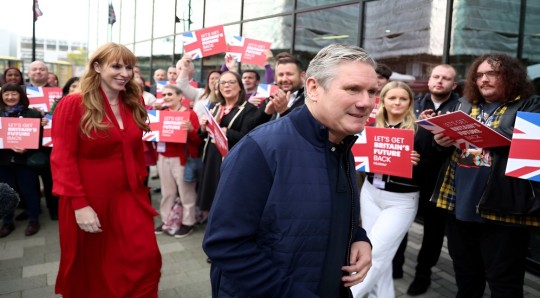
#LabourParty#UKelection#survey#historicwin#politics#UKnews#electionupdate#Labourvictory#surveyresult#politicalforecast#pollingdata#generalelection#currentaffairs#UKpolitics#historicevent#governmentoutcome#Britishpolitics#votingtrends#politicalsurvey#electionprediction
0 notes
Text
UK General Election 2024: Labour vs. Tories Economic Outlook
UK General Election 2024: Labour vs. Tories Economic Outlook It’s all about politics today, as Labour and the Tories go head-to-head in an attempt to sway Britain to choose their leader. With the General Election happening today all eyes are on the results which could shape the future of the UK significantly. Polls have suggested a potential win for Labour but as we’ve seen in previous…
#BritishPolitics#EconomicOutlook#ElectionDay#ElectionResults#FutureOfUK#GeneralElection#LabourVsTories#MarketImpact#PoliticalShowdown#UKElection2024#Vote2024
0 notes
Text
Who is Rishi Sunak? Everything you need to know about Britain’s prime minister
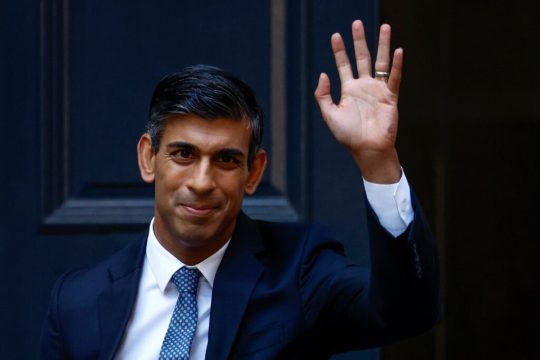
LONDON, ENGLAND - OCTOBER 24: New Conservative Party leader and incoming prime minister Rishi Sunak waves as he departs Conservative Party Headquarters on October 24,2022 in London, England. Rishi Sunak was appointed as Conservative leader and the UK's next Prime Minister after he was the only candidate to garner 100-plus votes from Conservative MPs in the contest for the top job. (Photo by Jeff J Mitchell/Getty Images) Rishi Sunak, a prominent figure in British politics, has risen swiftly through the ranks to become one of the most influential individuals in the UK government. Born on May 12, 1980, in Southampton, England, Rishi Sunak is the son of Indian immigrants who moved to the UK from East Africa in the 1960s. His father, Yashvir, was a general practitioner in the National Health Service (NHS), and his mother, Usha, worked as a pharmacist. Sunak's upbringing was marked by a blend of traditional Indian values and British culture, instilling in him a strong work ethic and a dedication to public service. Sunak's academic journey led him to study at the prestigious Oxford University, where he excelled in his studies, graduating with a degree in Philosophy, Politics, and Economics (PPE). After completing his education, he pursued a successful career in finance, working for investment firms like Goldman Sachs and later co-founding a hedge fund management firm. In 2015, Sunak entered the world of politics, contesting the parliamentary seat for Richmond, North Yorkshire, as a member of the Conservative Party. He won the seat with a significant majority and quickly made a name for himself as a diligent and articulate lawmaker. His rise to prominence within the Conservative Party was swift, and in February 2020, he was appointed as the Chancellor of the Exchequer, succeeding Sajid Javid. As Chancellor, Sunak has been at the forefront of the UK government's economic response to significant challenges, including the COVID-19 pandemic. He introduced unprecedented measures to support businesses and individuals affected by the pandemic, including the furlough scheme and various financial aid packages. His handling of the economic fallout from the pandemic has earned him both praise and criticism, with some lauding his swift action and others raising concerns about the long-term impact on public finances. Aside from his political career, Rishi Sunak is also a devoted family man. He is married to Akshata Murthy, the daughter of Narayana Murthy, the co-founder of Infosys, a prominent Indian multinational corporation. Akshata herself is a successful entrepreneur and businesswoman. Together, they have two daughters, making them a closely-knit family unit. In conclusion, Rishi Sunak's journey from the world of finance to the pinnacle of British politics is a testament to his ambition, intellect, and dedication to public service. As Chancellor of the Exchequer, he faces immense challenges but continues to navigate the complexities of economic policymaking with determination and resolve. With his background, skills, and unwavering commitment, Rishi Sunak remains a central figure in shaping the future of the United Kingdom. Read the full article
#AkshataMurthy#Britishpolitics#ChancelloroftheExchequer#ConservativeParty#COVID-19response#Finance#NarayanaMurthy#RishiSunak#UKeconomy
0 notes
Text
Rishi Sunak Sacked U.K. Home Secretary Suella Braverman following Weekend of Antisemitic and Far-Right Conflict in London
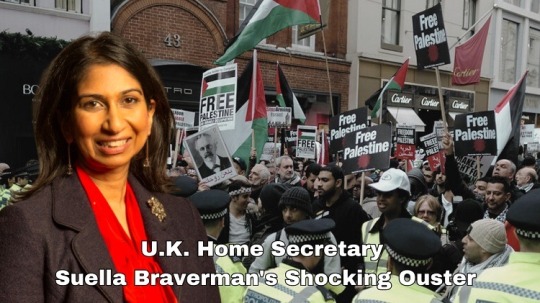
U.K. Prime Minister Rishi Sunak's decision to dismiss Suella Braverman from her role as Home Secretary comes in the wake of a tumultuous weekend marked by marches and protests in London. Braverman, responsible for law enforcement in England and Wales, faced the repercussions of expressing her concerns in an op-ed for The Times of London on November 8. In this piece, she focused on the "pro-Palestine movement," predicting that "hate marchers" would exploit Armistice Day, November 11, for a demonstration in London. Armistice Day, also known as Remembrance Day, holds significance globally as a day to commemorate the armistice signed between the Allies of World War I and Germany. Braverman's article raised issues surrounding the perceived bias of senior police officers in dealing with various protest groups, particularly during the COVID-19 pandemic. She questioned the differential treatment of lockdown objectors, Black Lives Matter demonstrators, right-wing protesters, and pro-Palestinian groups. The weekend's events unfolded with clashes between right-wing protesters, soccer hooligans, and the Metropolitan Police at the Cenotaph in London, the site where Remembrance Day is observed. This resulted in 120 arrests and injuries to several police personnel. A subsequent peace march witnessed instances of antisemitism, prompting calls from the opposition for Braverman's resignation. A day after these incidents, Braverman took to Twitter, praising the professionalism of the police but condemning the inflammatory and criminal behavior displayed during the protests. She expressed concern about the rising levels of hate, violence, and antisemitism in London, emphasizing the need for further action to address these issues. On Monday, Braverman was removed from her position for the second time, with her previous dismissal occurring during Liz Truss's brief tenure as prime minister. Sunak had reinstated her six days later when he assumed office. Braverman, upon her sacking, expressed gratitude for serving as Home Secretary and hinted at providing more insight in due course. Simultaneously, a cabinet reshuffle is in progress, with Foreign Secretary James Cleverly appointed as Braverman's successor and former Prime Minister David Cameron taking over as the new Foreign Secretary. In the aftermath of Braverman's dismissal, a notable rift emerged within the Conservative party, with differing opinions on the handling of the situation. Braverman's critical remarks on the police's approach to the pro-Palestinian march, her subsequent removal, and the reshuffling of key cabinet positions have fueled controversy. Some view her sacking as a mistake, arguing that she understood the sentiments of the British public, especially on issues related to protests and policing. The events surrounding Braverman's dismissal come amidst broader discussions on protest dynamics and policing strategies, with implications for community tensions. The Metropolitan Police emphasized the intensity of the debate on these matters, possibly alluding to Braverman's criticisms of the force. The independence of British police from government influence was highlighted, and the opposition Labour Party accused Braverman of undermining her office by seemingly questioning the judgment of senior officers. Allies of Braverman, including Conservative MP Andrea Jenkyns and former Cabinet minister Jacob Rees-Mogg, expressed support for her, framing her sacking as a consequence of speaking out. The debate within the Conservative party raises questions about the alignment of political leaders with the sentiments of the electorate, particularly in the context of upcoming elections. Read the full article
#braverman#Britishpolitics#homesecretaryuk#Policing#raelbraverman#RishiSunak#RuleofLaw#SuellaBraverman#ukhomesecretary#UnitedKingdom
0 notes
Text
Satire - What it can achieve Pt.3
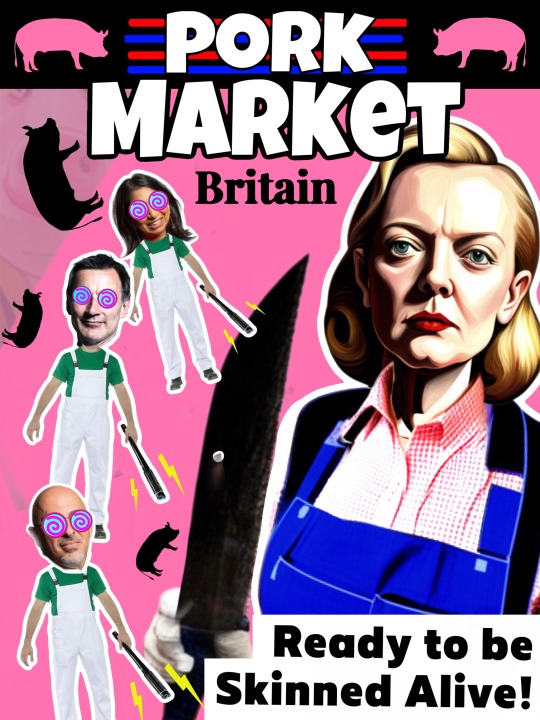
Visual design and humor share some interesting parallels, especially when it comes to the concepts of tension and recognition. Great visual design often works by creating a balance between familiarity and novelty. An effective design needs to resonate with the audience's prior knowledge and expectations ('familiarity') but also needs to provide something new or unexpected ('novelty') - equivalent to the punchline in a joke. This tension and subsequent release engages the viewer and makes the design memorable.
For example, a designer might use a familiar visual language or iconography in an unconventional way, surprising the viewer and making them see the familiar in a new light. This tension and recognition make for an engaging viewer experience, draw attention, and enhance recall, similar to how a good joke works.
Click below and explore my creative universe on Instagram!
https://instagram.com/electropaulodj?igshid=OGQ5ZDc2ODk2ZA==
#satire#progressive#fuckthetories#posterart#streetart#streetartist#art#london#ukpolitics#britishpolitics#uknews#politics#tories#toriesout#conservativeparty#conservatives#politicalmemes#politicsmemes#parody#unity#horrorart#design#graphicdesign#grit#weirdart#surrealism#iwasborntomakekafkareality#torycrimewave#delusionaldisorder#becarefulwhatvouwishfor
0 notes
Text

The next general election is shaping up to be one of the most consequential in modern British history. And if current trends continue, Nigel Farage and the Reform Party may very well emerge as the unlikely victors.
The question isn’t whether Britain is ready for Farage; the real question is whether Britain can afford not to be.
#ReformParty#NigelFarage#BritishPolitics#GeneralElection#UKPolitics#Brexit#PoliticalChange#FarageForPM#TwoPartySystem#PoliticalReform#ConservativeParty#LabourParty#Populism#PoliticalRevolution#UKIndependence#ImmigrationPolicy#NationalSovereignty#BritishElections#VoteReform
0 notes
Text
A New Era: @TMarshConnors is Now @AngryBritishCon
For years, I’ve been known on Twitter as @TMarshConnors, a handle I’ve had since the beginning. But as my brand, writing, and podcasting have grown under the Angry British Conservative name, it’s time for a change.
From today, my Twitter handle will be @AngryBritishCon a name that better reflects who I am and what I stand for. This shift isn’t just about a username; it’s about solidifying my identity across platforms, making it easier for people to find and engage with my work.
If you’ve followed me for my political takes, commentary, books, or podcast, nothing changes except the name. My voice remains the same direct, unapologetic, and always ready to challenge the status quo.
Thanks for being part of the journey. Onward!
– Angry British Conservative
#AngryBritishConservative#AngryBritishCon#BrandEvolution#NameChange#TwitterUpdate#Rebranding#PoliticalCommentary#BritishPolitics#ConservativeVoice#RightWingMedia#UKPolitics#FreeSpeech#BlogUpdate#Podcasting#WritingCommunity#PoliticalBlogger#BritishIdentity#SpeakingTruth#CulturalCritic#OnlineIdentity
1 note
·
View note
Text
It’s your boy - ranting about politics. Give me a follow if you fancy💙
163 notes
·
View notes
Text
BREAKING PROTOCOL- Queen Elizabeth & Prince Phillip, kneeling before a person of royal stature in a history first!!!
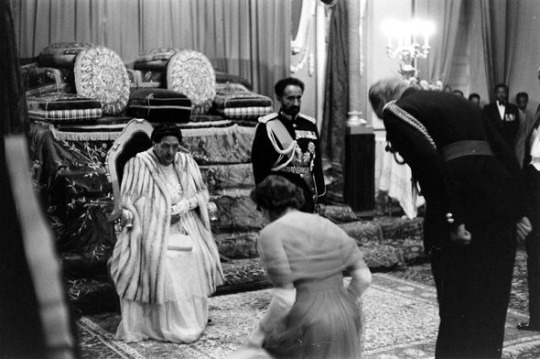
Queen Elizabeth and Prince Philip bowing before Emperor Haile Selassie I of Ethiopia and his wife, Empress Menen Asfew.
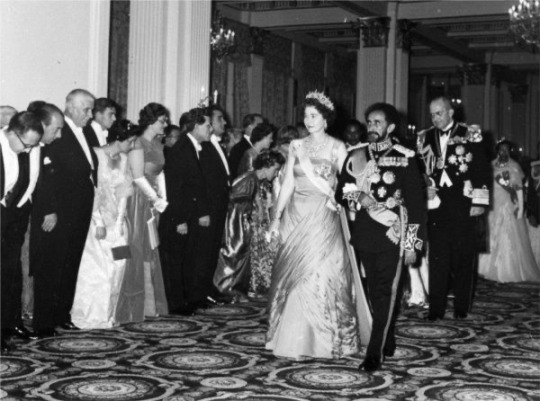
As far as it’s known Queen Elizabeth has never bowed before anybody else till this day. The Queen and Prince Phillip met the Ethiopian ruler Haile Selassie I, during a visit to Ethiopia In 1955. The photographs where captured during the Ethiopian Emperors Silver Jubilee celebrations in 1955 for Life Magazine by celebrity photographer at the time Alfred Eisenstaedt.
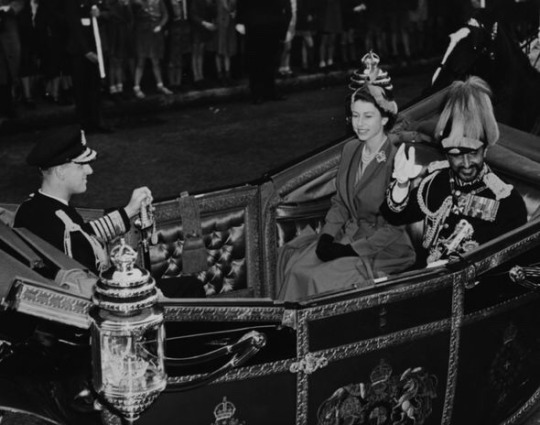
Royal protocol dictates the Queen is bowed to by those who greet her, including members of her own Royal Family. The Queen occasionally greets close friends with a kiss on the cheeks or a handshake. However, Queen Elizabeth broke the rules and bent her knee before the late Ethiopian Emperor, Haile Selassie I.

Queen Elizabeth has been on the throne for 68 years and in that time she has rarely bowed to anyone. The Queen and Prince Phillip broke protocol and extended royal courtesy to a monarch of an African nation. The British Monarchy adhere to Christianity and the late Ethiopian Emperor was wildly considered as The Messiah. The second coming of Christ. Worshipped as a prophet of God. Haile Selassie lineage can be traced back to the Solomon dynasty. A biblical bloodline that can be traced to Jesus. Queen Elizabeth broke protocol and extended Haile Selassie hounor of the highest regard. The Queen is of Christian faith, however she has never bowed to The Pope, the most God Elected figure in the Catholic Church.

Haile Selassie I wasn’t just considered earthly royalty. He was received to his people as ‘God incarnation’. As Ethiopian tradition dictates, all rulers of the throne must have traceable lineage to a biblical house. He is a direct descendant of King Solomon and The Queen of Sheba which makes him also a descendant of Jesus. The House of Solomon can be traced to King David. Therefore making Haile Selassie of ‘spiritual royalty’, essentially kin of Jesus. The entomology of Haile Selassie name means "Power of the Trinity". Haile Selassie's full title in office was "By the Conquering Lion of the Tribe of Judah, His Imperial Majesty Haile Selassie I, King of Kings, Lord of Lords, Elect of God".
#Queen Elizabeth#buckingham palace#royal family#haile selassie#emperor#prince william#british monarchy#Great Britain#historical figures#queen of england#prince phillip is dead#BLM#black lives matter#britishpolitics#british empire#activists#England#hrh prince philip#Jesus#rip prince philip#the royal family#british royal family#the queen of england#prince harry#megan markle#the duke of edinburgh#his royal highness#her majesty#prince phillip
345 notes
·
View notes
Photo

HEY, you’re doing great!
and take it from him^ a snail in a top hat. Take a breather, drink some water, maybe grab a kit kat if you’re feeling cheeky, and remember, you’re doing great xo Oh! and if you like this, give us a follow 😌 https://www.instagram.com/p/CJwF8swDHzY/?igshid=15pxw2saxo8g5
#mentalhealth#mentalhealthawareness#mentalhealthquotes#dailymotivation#dailyart#snail#nature#natureart#tophat#youredoinggreat#graphicdesign#graphicdesigner#louder#louderdesigns#art#artist#british#britishbusiness#britishpolitics#gender#sexuality#environment#class#socialclass#england#socialchange#smallbusiness
10 notes
·
View notes